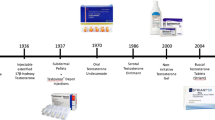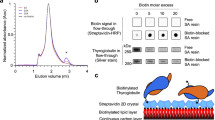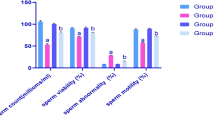Abstract
IT was shown recently1 that the rate of incorporation of glycine-l-14C into kidney slice protein of A/Jax mice treated with testosterone propionate was significantly higher than into slices from untreated animals. The maximum increase (35–80 per cent) appeared 48 hr. after beginning daily injections of 1 mgm. testosterone propionate, after which the difference between the treated and control series gradually disappeared. A study of some of the characteristics of this response revealed that the difference in incorporation-rates was greatest at low glycine concentrations, and diminished when the glycine concentration of the incubation medium was raised to 4–8 mM. It was postulated that under these conditions the effect of this steroid was to facilitate the intracellular accumulation of glycine from a relatively glycine-deficient environment.
This is a preview of subscription content, access via your institution
Access options
Subscribe to this journal
Receive 51 print issues and online access
$199.00 per year
only $3.90 per issue
Buy this article
- Purchase on Springer Link
- Instant access to full article PDF
Prices may be subject to local taxes which are calculated during checkout
Similar content being viewed by others
References
Frieden, E. H., Laby, M. R., Bates, F., and Layman, N. W., Endocrinol., 60, 290 (1957).
Author information
Authors and Affiliations
Rights and permissions
About this article
Cite this article
FRIEDEN, E., COHEN, E. Effect of Testosterone Propionate upon the Incorporation of Labelled Glycine into Homogenates of Mouse Kidney. Nature 181, 912–913 (1958). https://doi.org/10.1038/181912a0
Issue Date:
DOI: https://doi.org/10.1038/181912a0
This article is cited by
-
�ber die Wirkung von Testosteron auf die normale M�useniere
Zeitschrift f�r Zellforschung und Mikroskopische Anatomie (1968)
Comments
By submitting a comment you agree to abide by our Terms and Community Guidelines. If you find something abusive or that does not comply with our terms or guidelines please flag it as inappropriate.



